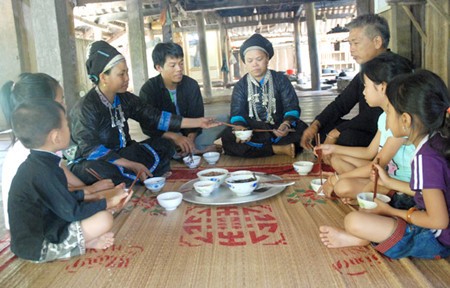(VOVworld) – Nung society has developed close connections in residence, lifestyle, economics, and culture. The Nung live harmoniously and united in a close-knit community.
The Nung ethnic minority group migrated to Vietnam’s northern mountain region hundreds of years ago. Since then they have divided into several branches, including the Nung An, the Nung Lai, the Nung Chao, and the Nung Din and have scattered into many provinces, but they maintain regular contact with each other and have preserved their traditional customs.
 |
A meal of a Nung family in Deo Tram hamlet, Tien Bo commune, Yen Son district, Tuyen Quang province. (photo: baotuyenquang.com.vn)
|
Hoang Van Pao, a cultural officer for Lang Son province where a large number of Nung live, says. “The Nung live in stilt houses or earth houses. Many clans live together in a hamlet which consists of about 40 houses. Almost all activities, rituals, and religious practices take place in their houses. The Nung are patriarchal.”
In a Nung family patriarchal rules are reflected in their daily activities. The father or the husband decides family matters such as dividing assets. The sons are the heirs. The eldest son, who will live with and take care of his parents, receives the biggest share. When their parents die, the sons are in charge of the funerals and worship ceremonies.
Trieu Thuy Tien, a cultural officer for Lang Son province, says: “They live united to protect and support each other in their housework and production. They Nung respect family hierarchy and bonds.”
A Nung hamlet often has a common house to worship the hamlet Genie. It’s a venue for festivals and community meetings.
Hoang Van Son, a Nung man in Cao Loc district, Lang Son province, says: “We have unity and consensus in family and community work. For example it would take me several months to build a house without support from my relatives and other villagers. They help me transport materials and build the house without conditions.”
A Nung family is economically independent. The men do the heavy work while the women do the lighter work. Weaving, cutting grass, and tending animals are often done by women and children.